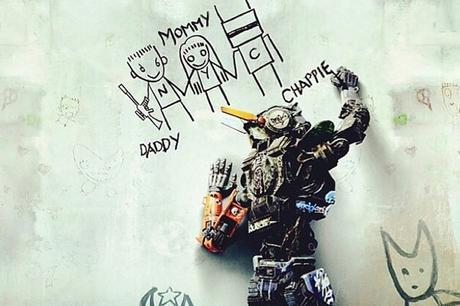
ith every original idea comes the same problem. Creating new characters that entertain and intrigue audiences is one of the biggest issues. Certainly the genre of Science fiction is no stranger to having difficultly developing new universes. There have been some great recent stories adapted from short stories or graphics novels such as Edge of Tomorrow and Snowpiercer. Others with their directors taking on the writing effort didn’t fair so well critically such as Interstellar and Jupiter Ascending. On the other hand, it is increasingly more difficult to create a new story. Director Neill Blomkamp hopes to buck the trend of recent disappointments with his new film, Chappie. Will his new story be able to overcome other disappointments or even rise above the mediocrity of Elysium?
Chappie is an original story from Neill Blomkamp featuring a talking robot of all things. In the future, the people are governed by a mechanized police force. One of the droids is compromised, Chappie, and learns the ability to think and feel for himself. Now there are forces that plan to destroy Chappie and ensure he is the last of his kind. Is Chappie really a new idea or just a twist on some existing Science fiction tropes? As with most successful Science fiction it’s all about taking some existing ideas and doing enough to make them new again. Chappie borrows ideas that have been seen in Japanese anime such as the Animatrix and Appleseed, as well as creating a hero that seems like a dark Short Circuit clone. If Chappie is going to be successful it will need to pave its own path, without seeming like a retread.
What is promising for Chappie is Neill Blomkamp’s history with Science-fiction stories. After having been approached to do a adaptation of the popular Halo series that unfortunately fell through, Blomkamp went on to pen and direct District 9. District 9 was also an original story, which focused on alien immigration and a documentary style approach. Universally praised, it was one of the first sci-fi series nominated for an Oscar in years and made people forget about Halo. Blomkamp then went on to direct his second feature film, Elysium, another story of class separation. What worked so well in District 9, such as the characters and plot, seemed to have taken a massive step back in Elysium.

What about some other directors’ known for taking chances on science-fiction properties. The Wachowski’s just recently released Jupiter Ascending and saw another one of their post-Matrix films critically and financially destroyed. The Wachowski’s created their own script and directed Jupiter Ascending, but maybe next time they should just direct. The plot of the movie followed any number of sci-fi romances and the characters were paper thin outside of Mila Kunis. Their visual effects team successfully created some spectacular visuals, but that isn’t enough when audiences are laughing at a picture that was trying to be serious.
Whereas Jupiter Ascending was a spectacular failure, Interstellar failed to captivate its audiences. Christopher Nolan has more often than not written original material for his feature films and Interstellar continued that trend. It included elements of space travel and plenty of mathematics, but it was too dense for many to appreciate. It was another beautiful and technical marvel that found critics disappointed in the many turns it took. On the other hand, it wasn’t a financial disaster, but that could be attributed more to the name of Christopher Nolan than to the actual quality of the film.
One of the biggest things Chappie has to overcome is making compelling characters and with a story audiences can grab onto. District 9 worked because audiences could associate with Sharlto Copley’s character and believed in the fiction it created. While audiences are clamoring for new ideas from Hollywood, screenwriters and directors need to create stories audiences can get behind. Unfortunately, a robot that develops human feelings doesn’t exactly seem like the way to success.

